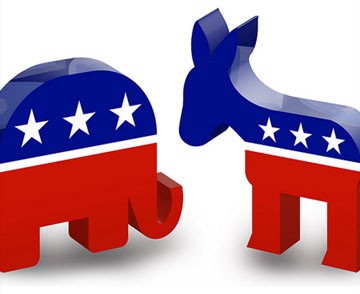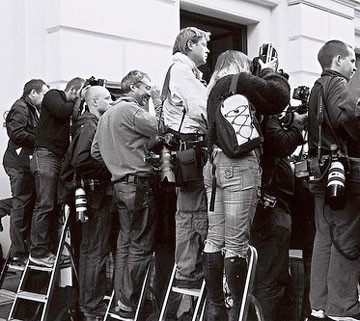Partisan Groups Playing Dirty in Brown Warren Race
Saturday, July 28, 2012

“It is an increasing issue. Campaigns are using trackers to see if they can get them to make a controversial statement or something that makes them look bad, and if you can find that, that person is worth their weight in gold,” said Darrell West, vice president and director of Governance Studies of the Brookings Institute.
During political races, third party groups will often hire campaign trackers. These paid personnel follow the candidates, videotaping to catch any controversial or clumsy words. While these positions aren’t new to politics, a new tactic has arisen during this race.
Posing to Get the Gaffe
Warren appeared in Worcester to receive an endorsement from the Massachusetts Credit Union League. After her speech, she took questions. The first person to offer a question was a young man dressed in a Warren campaign shirt.
The individual’s question pertained to a press release the Brown campaign sent out at noon that day. Warren campaign press secretary, Alethea Harney, quickly addressed the young man, asking him, “Are you with the Brown campaign?” He then finished his question and left quickly thereafter.
Members of the Warren campaign said this has happened multiple times in the past., but according to Brown’s press secretary, their team had nothing to do with it.
“These sorts of things certainly cross the line and are pushing the boundaries. We’re seeing homes being filmed and reporters asking what car they drive,” said Clark University professor of political science, Robert Boatright. “Those who run for office give up a lot of privacy, but they know they will be watched all the time. Unfortunately, this does deter a lot of people from running. It’s very harmful to the system.”

Warren during the endorsement in Worcester
Never Seen Before

Warren during the endorsement in Worcester
The use of trackers in campaigns is nothing new, but West says this is the first time he has heard of one posing as a supporter.
“I haven’t seen that. That’s pretty deceptive. Typically trackers pose as an average citizen and not a supporter. Everybody wants to catch the opponent, and I think this will be increasing,” he said.
Political expert from The Cook Political Report, Jennifer Duffy, said that trackers and individuals sent from campaigns to ask questions both fill different roles, and while the Brown campaign denied a connection in this case, she said, “The idea of campaigns or state parties sending someone to an event to ask a candidate a question is older than both of us, and certainly predates trackers by a couple of decades,” she said. “I think it is different from campaign trackers, who become pretty well known to the campaigns they are tracking. I think they are now a permanent fixture, but there are certainly boundaries trackers shouldn't cross.”
Who’s Responsible?
Often, third party groups, like state committees will become involved in hiring campaign trackers, and while MassGOP did admit to having a hired tracker at the endorsement event, they said they were not affiliated with the individual posing as a supporter, therefore also not the ones who paid for the Warren t-shirt.
MassGOP’s Communications Director, Tim Buckley released a statement saying, “Like our Democratic counterparts who have been following Scott Brown with multiple trackers for more than a year, we also track Elizabeth Warren’s public appearances to hold her accountable for her job-destroying, tax and spend policies,” he said. “It’s unfortunate that Professor Warren believes we should still ‘move on’ from the health care debate, even after this week’s report from the CBO revealed that Obamacare will be even worse for our country and economy than expected.”

Degrading the Race

When asked about the impact on political races, West said, “I find it compromising. In one way it can have a devastating impact. YouTube guarantees a market so if you find something good you can end up with a huge audience.”
Professor Boatright raised examples of political campaigns in the past that have been rocked by the stealth work of campaign trackers and added that YouTube has been a huge contributing factor. In 2010, Bob Etheridge (D-NC) lost in the race for a House seat, something Boatright attributed to a tracker’s video.
“He was accosted in the street by this group of guys who stood in his way and were asking him questions. They got his response on camera, where he sort of bounced them off, and many say that event was what cost him the race,” he said. “The fact that anyone can put up a video has certainly increased campaign tracking. Anyone can get into the act.”
Trackers have also made waves lately in the House of Representatives.
“House Democrats are now taking video of GOP homes and putting them on the web. They have been widely criticized for this and it probably crosses the line,” Duffy said, adding that some things – like candidates’ children and spouses – are off limits.

Third Party Players

The race between Brown and Warren is marked by a unique agreement, barring attack ads from third party groups, but despite the People’s Pledge that made this move to fairness, campaign tracking continues to be a big issue.
When asked about the advantages of signing the People’s Pledge, Warren press secretary, Alethea Harney said, “The People's Pledge means that here in Massachusetts, the candidates will make their best case to the people and not shadowy third party groups with secret funders paying the bills.”
Likewise, Brown’s press secretary, Alleigh Marre added, “We’re pleased that Scott Brown’s People’s Pledge has kept Super PACs and third-party groups off the Massachusetts airwaves, and we’re hopeful they will continue to stay out in the months leading up to the election.”
While the agreement has kept third party groups from mudslinging on the airwaves, it will not stop them from funding campaign trackers to catch every gaffe.
Related Articles
- NEW: Republicans Hammer Warren for Misleading Response
- Will Brown-Warren Deliver Bipartisan Promises?
- Washington Expert Says Blunders May Decide Brown v Warren Race
- Brown Collects Three Times the PAC Money of Warren
- Mass Credit Union League Endorses Warren
- NEW: Brown: Warren’s Heritage Blunder About ‘Character, Honesty’




Follow us on Pinterest Google + Facebook Twitter See It Read It